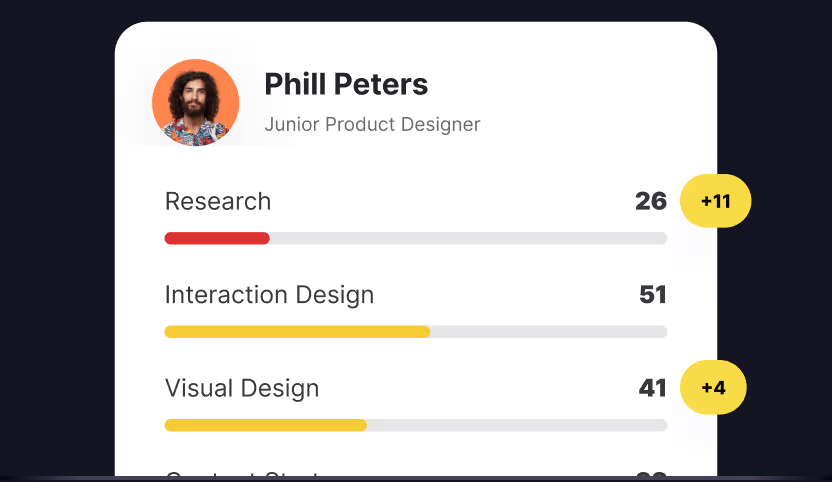
Artificial Intelligence is no longer a niche skill set, it's rapidly becoming a must-have for professionals across industries. Whether you're in product design, marketing, development, or operations, understanding how AI works can set you apart. But high-quality AI education doesn't have to be expensive. Many respected institutions and platforms offer free AI courses that are accessible, comprehensive, and suitable for self-paced learning.
This guide highlights the best free AI courses available in 2026. All listed programs are online and globally accessible. Some offer optional paid certificates, while others include assessments, labs, and community interaction at no cost. We’ve chosen these programs based on credibility, course quality, and practical application. Whether you’re just exploring AI or looking to deepen your existing knowledge, these free options are worth your attention.
1. Uxcel — AI fundamentals for UX course
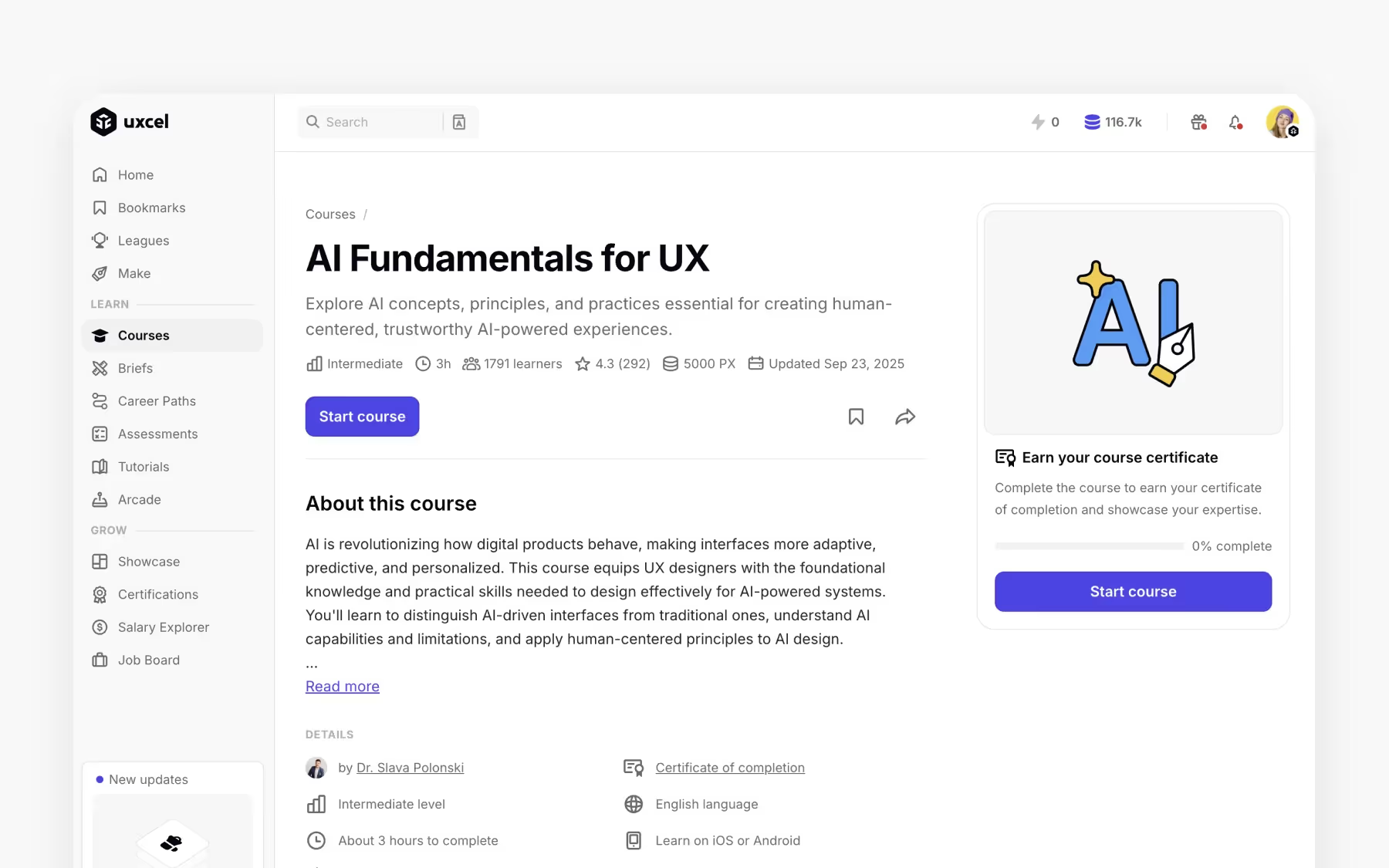
Uxcel, known for its bite-sized, interactive learning for UX and Product professionals, is venturing into AI and PM. This new series of courses are targeting both beginners and professionals who are searching for polishing their skills, or starting their journey with AI.
The AI fundamentals for UX course is designed to be fully self-paced and accessible through Uxcel’s core platform. Learners can explore visual, scenario-based modules that explain how AI is impacting workflows, product design, user experience, and business operations. There’s no need for prior programming experience, making it especially accessible to creative professionals.
This is particularly helpful for professionals exploring how to apply AI responsibly in their existing roles. It introduces common AI tools and terminology, real-world use cases, and ethics in design and decision-making. Learners will receive skill assessment checkpoints along the way through Uxcel’s signature Skill Graph, helping them benchmark progress and spot knowledge gaps.
Other courses that are currently available are the AI Prompts Foundations course, the Enhancing UX Workflow with AI course, and the Human-Centered AI course, with many more to come.
Top Features:
- Join Uxcel waitlist for valuable prizes
- Scenario-based learning, no coding required
- Integrated skill tracking via Uxcel’s Skill Graph
- Multiple courses available
Ideal for: UX designers, product managers, and professionals in adjacent digital roles looking for a non-technical introduction to AI concepts
2. Google — Machine Learning Crash Course (MLCC)

Google’s Machine Learning Crash Course is a free, self-paced resource developed by Google AI. Originally designed for internal use at Google, it’s now publicly available and provides a comprehensive introduction to core machine learning concepts. The course combines short lessons with real-world exercises using TensorFlow APIs, making it one of the most widely used free ML training resources on the internet.
The curriculum includes 25+ lessons, 30+ interactive exercises, and various real-world case studies. Topics covered include loss functions, overfitting, generalization, classification models, and neural networks. While it doesn’t award a certificate by default, it offers deep technical insights, and many employers recognize it as a serious commitment to learning.
The MLCC is best suited for learners who already have a basic understanding of Python and high school-level math. It’s not designed for complete beginners or non-technical professionals, but it is accessible to self-motivated learners who want to understand how machine learning works under the hood.
What makes this course valuable is its credibility; it’s designed by one of the leading AI research companies in the world and continues to be used internally by Google’s engineers. While it doesn’t offer personalized mentorship or formal verification, the hands-on exercises and structured learning flow make it ideal for technical upskillers.
Top Features:
- Developed and used by Google engineers
- Covers practical and theoretical machine learning topics
- TensorFlow-based programming assignments
- Entirely free and self-paced
Ideal for: Developers, engineers, and technical professionals with basic Python skills looking to gain hands-on machine learning experience
3. Harvard University — CS50’s Introduction to Artificial Intelligence with Python

This free AI course is a part of Harvard’s renowned CS50 series. It introduces learners to the principles and technologies that drive modern AI, including knowledge representation, search algorithms, neural networks, and natural language processing. The course uses Python for practical assignments and is structured like a university-level course.
While the content is free to access, learners can choose to pay a small fee for a verified certificate. The course includes a series of lectures, hands-on projects, and problem sets that simulate real-world AI challenges. The final project allows learners to build an AI-based system from scratch.
This course assumes some prior experience with Python and programming fundamentals, but the instruction is clear and student-friendly. It’s designed for learners who are ready to move beyond beginner-level AI concepts and want a deeper academic challenge.
CS50’s AI track is praised for its clarity, rigor, and real-world applicability. Many participants use this course as a bridge to more advanced AI or machine learning training and value its association with Harvard’s computer science faculty.
Top Features:
- Taught by Harvard professors via edX
- Python-based hands-on projects and capstone
- Free to audit; certificate optional for a fee
- Strong academic credibility
Ideal for: Intermediate learners, aspiring developers, and students seeking university-quality AI education with hands-on coding
4. IBM — AI Foundations for Everyone (Coursera)
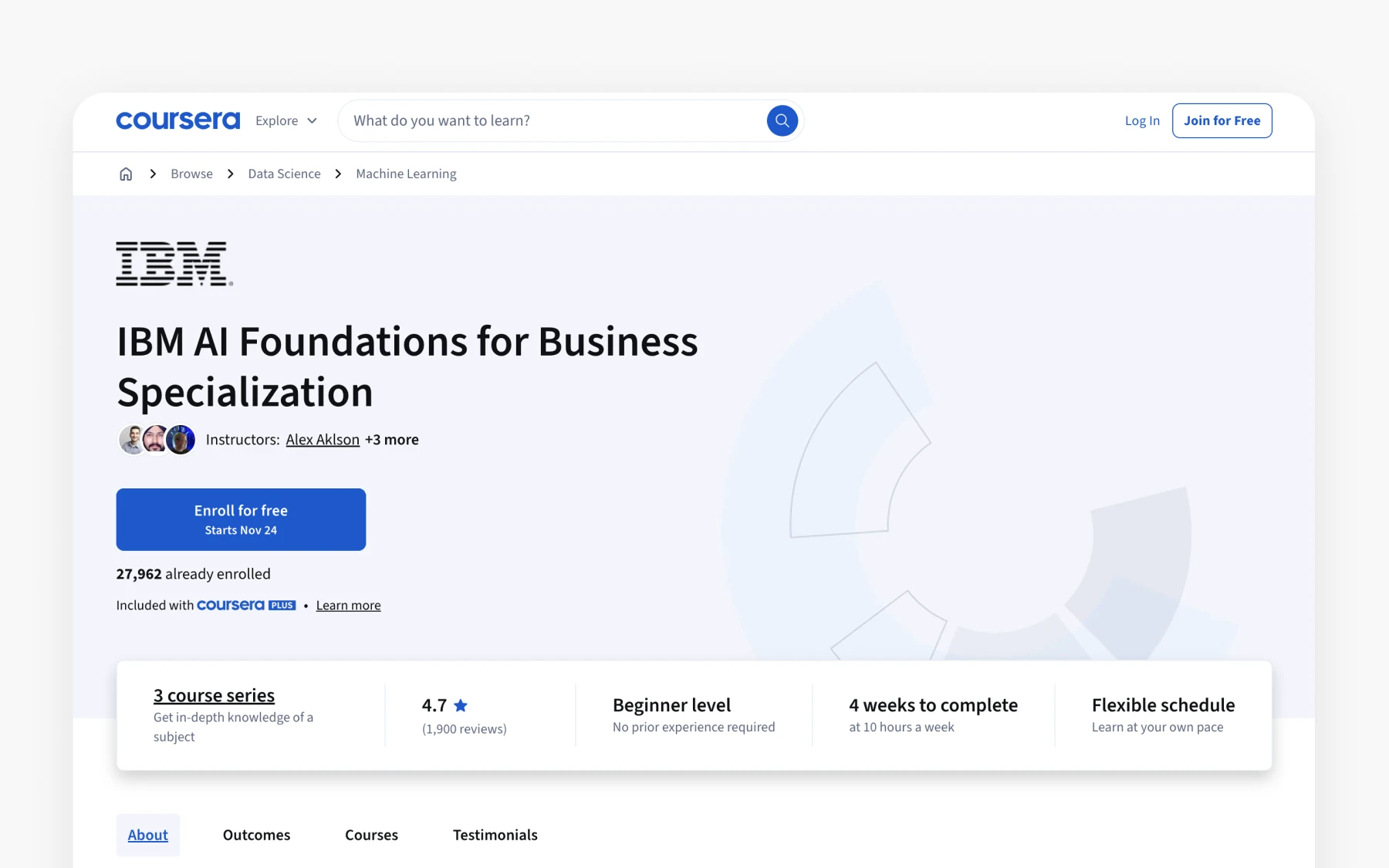
IBM’s "AI Foundations for Everyone" is a beginner-friendly, free-to-audit course hosted on Coursera. It aims to demystify AI by covering foundational topics such as machine learning, neural networks, natural language processing, and computer vision, without requiring a coding background. This course is part of IBM’s broader professional certificate series and serves as a gentle introduction for anyone interested in understanding AI’s real-world impact.
The course is entirely self-paced and includes short videos, quizzes, and interactive content. Learners can access all materials for free, and only pay if they choose to obtain a certificate (usually via Coursera’s subscription). Upon completion, students gain a strong conceptual understanding of AI tools and workflows, which is especially useful for roles in operations, design, business, or project management.
This course is ideal for professionals who work alongside AI teams but are not directly involved in programming or algorithm development. It’s also great for curious learners looking to break into the AI space without immediately diving into math-heavy content.
IBM’s global brand recognition and practical teaching approach make this course a valuable starting point. While it won’t turn you into a developer, it’s an effective primer for understanding the principles behind today’s most powerful AI systems.
Top Features:
- Beginner-friendly, no coding required
- Hosted by IBM experts via Coursera
- Free to audit, certificate optional
- Business and real-world applications of AI explained
Ideal for: Business professionals, project managers, and non-technical learners exploring AI concepts and use cases
5. DeepLearning.AI — ChatGPT Prompt Engineering for Developers

This short course, created by DeepLearning.AI in collaboration with OpenAI, teaches prompt engineering using ChatGPT. It’s designed to help developers and technical professionals write effective prompts for AI models, particularly large language models (LLMs). The course is free, includes hands-on labs, and is hosted on the DeepLearning.AI platform.
The curriculum focuses on practical use cases like summarization, classification, and transformation using OpenAI’s API. You’ll learn how to guide the model’s output, design prompts for reliability, and integrate prompt techniques into software applications. No formal certificate is issued, but the course can be completed in under two hours, making it a high-value, fast-paced introduction to prompt design.
This course assumes some technical background and familiarity with Python. While it’s not meant for total beginners, it’s approachable for product managers, engineers, or developers already experimenting with ChatGPT or GPT-based tools.
Because it's taught by Andrew Ng and his team, the content is structured, efficient, and grounded in real developer workflows. It’s one of the most practical introductions to prompt engineering currently available for free.
Top Features:
- Created by DeepLearning.AI in partnership with OpenAI
- Focus on prompt design and integration into applications
- Quick, high-impact learning format
- Hands-on examples and real use cases
Ideal for: Developers, engineers, and product managers exploring prompt engineering and LLM-based AI applications
6. Kaggle — Intro to Machine Learning and AI Micro-Courses

Kaggle, the online data science competition platform, offers a series of free AI and machine learning micro-courses that focus on practical skills used in real data science projects. These micro-courses include “Intro to Machine Learning,” “Intermediate ML,” “Deep Learning,” and more.
The courses are interactive and browser-based, which means learners can write and execute code in a notebook interface directly from the web, no installation required. They cover essential topics like decision trees, model validation, pipelines, and deep neural networks, all using Python and popular libraries such as scikit-learn and XGBoost.
There’s no official certificate offered, but Kaggle profiles and completed course badges are recognized by the data science community and can be showcased publicly. These micro-courses are designed for learners who want fast, no-fluff instruction with code-first applications.
Because they’re modular, learners can start at any level and progress to more advanced topics at their own pace. This makes them perfect for professionals looking to acquire practical AI skills quickly.
Top Features:
- Interactive, code-first courses in-browser
- Focus on practical tools like scikit-learn and XGBoost
- Community-driven learning with leaderboard incentives
- Free access to datasets and kernels
Ideal for: Aspiring data scientists, machine learning enthusiasts, and professionals looking for practical project-based AI learning without theory overload
7. LinkedIn Learning — Getting Started with AI and Machine Learning
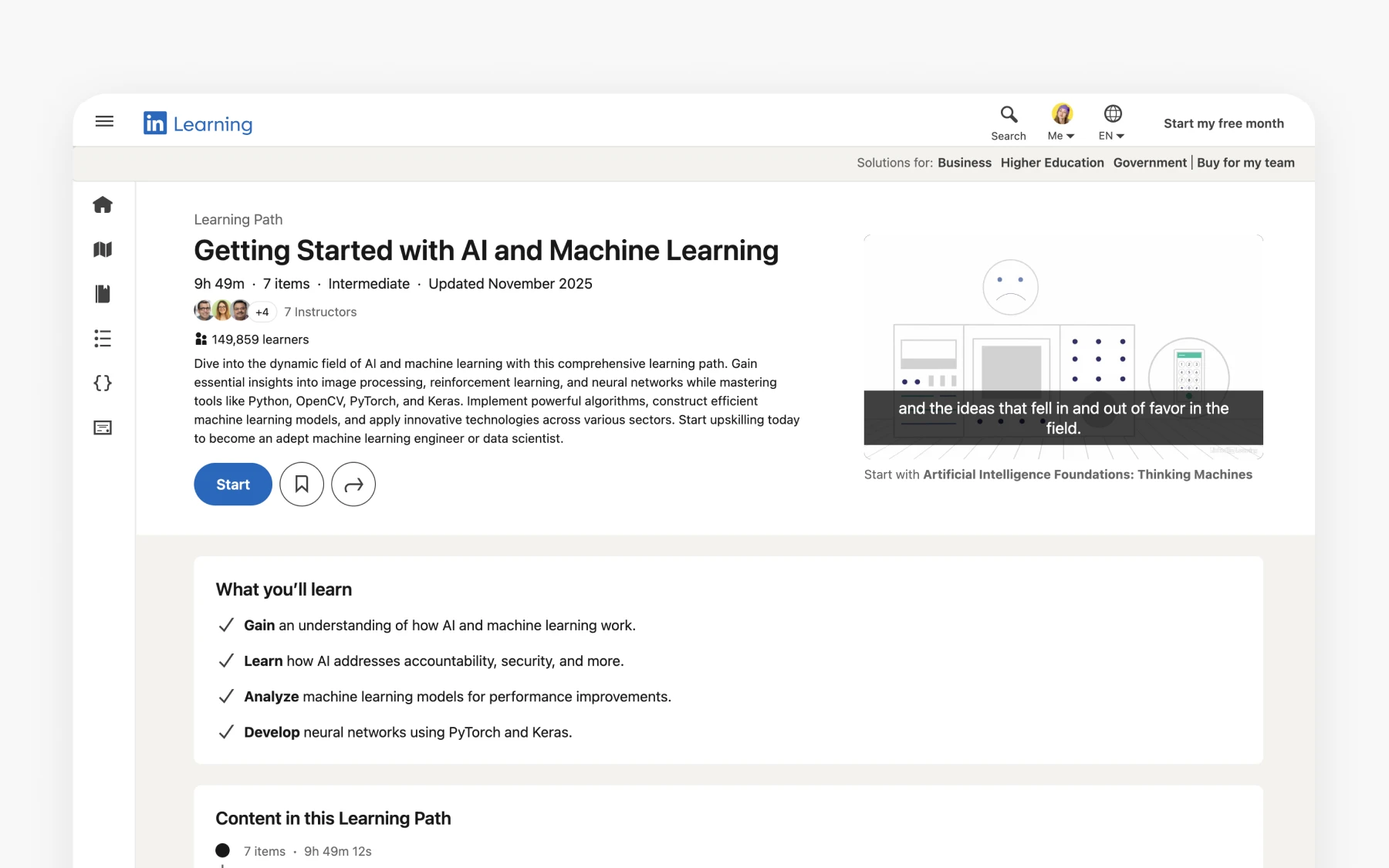
LinkedIn Learning offers several free AI-related courses, including “Getting Started with AI and Machine Learning”. These courses are geared toward business professionals and generalists who want to understand AI basics and how these technologies impact operations, customer service, and decision-making.
Although LinkedIn Learning typically operates under a subscription model, new users often receive a 1-month free trial during which they can complete multiple courses and earn certificates of completion. The certificates can be directly added to your LinkedIn profile, enhancing your professional visibility. Each course includes video lessons, short quizzes, and knowledge checks but doesn’t require any programming or math background.
These AI courses emphasize real-world business use cases, ethical considerations, and how to communicate effectively about AI in leadership and cross-functional settings. The instruction is clear, non-technical, and designed for accessibility across industries.
The platform is especially useful for professionals in marketing, HR, sales, or management roles who want to stay relevant as AI adoption becomes standard in enterprise workflows.
Top Features:
- Courses led by industry professionals and business strategists
- Professional certificates that integrate with LinkedIn profiles
- Suitable for non-technical audiences
- Available via free trial access
Ideal for: Managers, marketers, and generalists who want to gain AI fluency without diving into programming or data science
8. Udacity — AWS Machine Learning Foundations

The Machine Learning Foundations Course from AWS, in partnership with Udacity, is a free online program created to introduce learners to the core concepts of AI and ML. Originally part of AWS's scholarship program, this course remains available to the public for free and includes hands-on labs, quizzes, and video instruction.
The content includes supervised learning, unsupervised learning, linear regression, and neural networks. It’s meant to provide foundational ML understanding before progressing to more advanced topics or paid nanodegrees. Learners use AWS’s cloud-based tools and environments, which helps develop practical skills in managing ML projects on enterprise-grade platforms.
Although the course itself doesn’t issue a certificate unless taken through a scholarship cohort, it’s still valued as a stepping stone into AWS’s broader machine learning certification path. Those who complete the course often continue into paid credentials like the AWS Certified Machine Learning – Specialty exam.
This course is ideal for learners interested in gaining experience with Amazon’s ecosystem while developing real-world ML skills through cloud infrastructure.
Top Features:
- Co-developed by AWS and Udacity
- Real-world AWS environment exposure
- Strong foundation for further AWS certification
- Free for self-paced learners
Ideal for: Technologists and developers exploring ML with cloud platforms, especially those intending to pursue AWS certification paths
9. Simplilearn — Artificial Intelligence for Beginners

Simplilearn’s “Artificial Intelligence for Beginners” is a free foundational course designed for learners who want a quick, accessible introduction to AI concepts. It’s part of Simplilearn’s SkillUp initiative, which offers free training in various digital skills, including cloud computing, AI, data science, and more. The AI course includes approximately one hour of self-paced video lectures and requires no technical background to begin.
The curriculum covers AI basics such as what artificial intelligence is, the difference between AI, machine learning, and deep learning, and how AI is used in real-world applications. It also introduces learners to key trends in the field and potential career paths. While the course is short, it’s strategically structured to help absolute beginners build confidence before pursuing more in-depth training.
Learners who complete the video lessons are eligible for a Simplilearn course completion certificate, which can be downloaded and added to a CV or LinkedIn profile. Since it’s part of SkillUp, access to the course is time-limited to 90 days from enrollment, encouraging learners to complete it in a focused window.
Although not comprehensive, this course provides a solid orientation to AI and is ideal for individuals who want to assess their interest in the field before committing to a more advanced program. It's a gentle introduction, perfect for professionals from non-technical backgrounds or students exploring career options.
Top Features:
- Free course under SkillUp initiative
- Designed for non-technical beginners
- Completion certificate available
- Covers AI, ML, and real-world applications
Ideal for: Beginners seeking a short, self-paced introduction to artificial intelligence with certification
10. Elements of AI — Free AI course by University of Helsinki
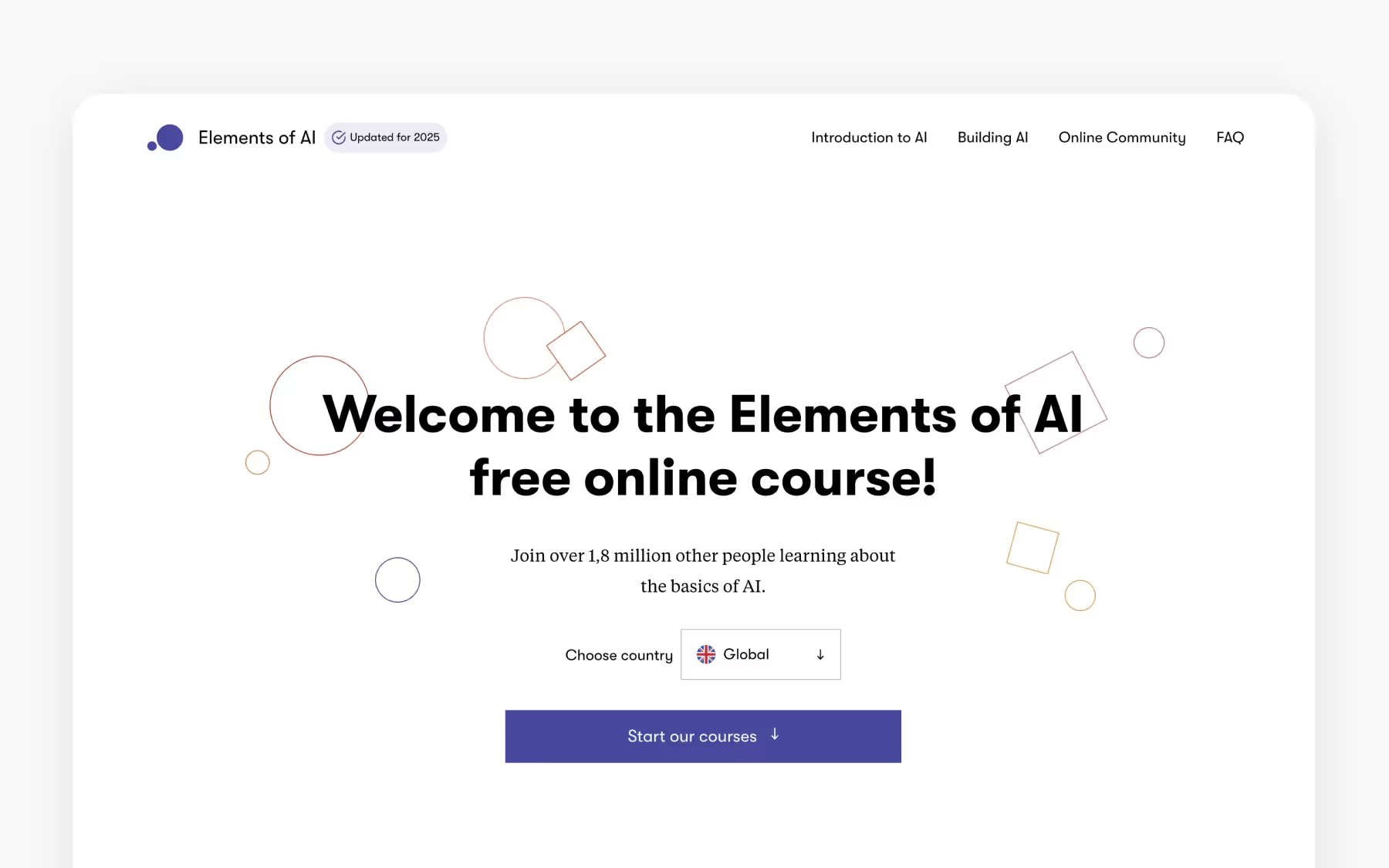
The Elements of AI is a globally recognized, free AI course created by the University of Helsinki in collaboration with the Finnish tech company Reaktor. It’s aimed at making artificial intelligence more understandable and accessible to the general public, regardless of professional or academic background. The course has been translated into over 20 languages and has been taken by hundreds of thousands of learners worldwide since its launch.
Structured into six modules, the course covers key areas such as the definition of AI, neural networks, machine learning, and real-world implications of algorithmic decision-making. It combines short readings, multiple-choice questions, and short-answer tasks to reinforce learning and ensure learners can apply what they’ve understood. There are no videos or coding exercises, making it ideal for learners who prefer reading-based content and theoretical learning.
While it doesn’t include coding or highly technical materials, the Elements of AI still manages to communicate many of the essential concepts in AI, including its limitations and ethical considerations. It places particular emphasis on how AI affects society and individual lives, making it especially valuable for policymakers, business leaders, and students in social sciences or humanities who are looking to enter the AI conversation without needing to program.
Upon completion, learners receive a certificate co-signed by the University of Helsinki. This certificate can be shared on LinkedIn or resumes, and while not as credentialed as a university degree, it holds respect in professional and educational communities due to its academic backing and widespread usage.
Top Features:
- Created by University of Helsinki and Reaktor
- Available in over 20 languages
- Entirely free with certificate
- Non-technical, theory-focused learning
Ideal for: Curious learners from non-technical backgrounds, policymakers, educators, and professionals interested in the societal implications of AI
11. Oxford Home Study — Free AI courses
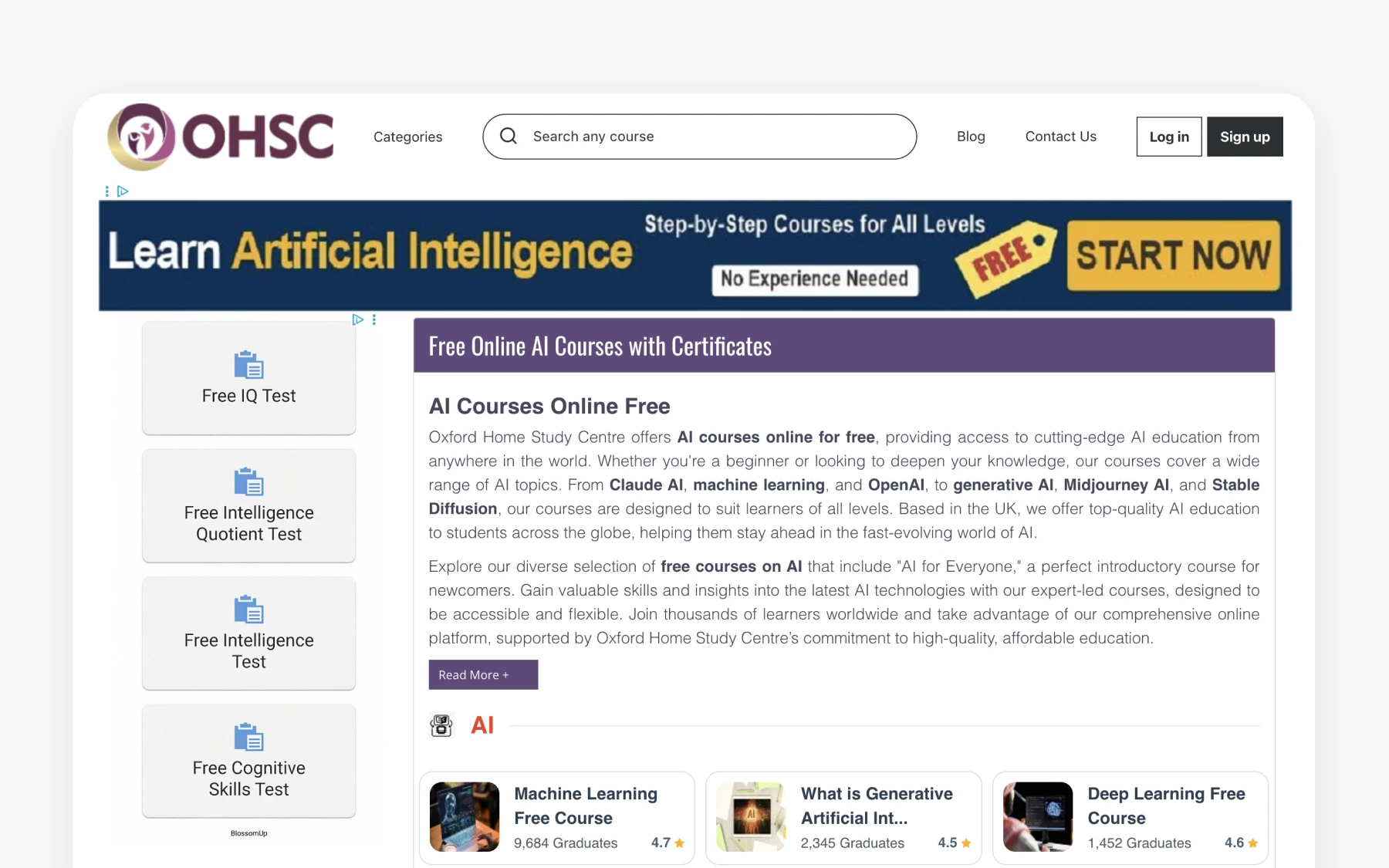
Oxford Home Study Centre (OHSC) offers completely free online courses in Artificial Intelligence that serve as a basic introduction to the field. Unlike university-backed programs, OHSC operates as a private distance learning provider, yet it has gained attention for its accessible, no-cost courses that come with the option to purchase a certificate of completion. The AI course introduces foundational concepts without overwhelming learners with complex technical material.
These courses consist of several modules covering the definition of AI, key use cases, major types of AI systems, and a brief overview of historical developments. It is designed for self-paced learning and is accessible immediately upon enrollment without any prerequisites. Although relatively brief, it aims to provide learners with enough background to make sense of AI discussions in business and media contexts.
While the learning experience is largely text-based and lacks interactivity, it’s ideal for learners looking to gain a basic understanding of AI without any pressure. It is not a suitable course for those looking for hands-on skills, coding projects, or real-world application training. However, for absolute beginners who want a free and quick introduction, it offers a low-friction starting point.
Upon completion, students can opt to pay a small fee to receive an official certificate of completion from OHSC. This is optional, and the core course content remains entirely free. The certificate is not academically accredited but can be a confidence booster or stepping stone toward more in-depth learning.
Top Features:
- 100% free enrollment and study access
- Simple, beginner-friendly written content
- Optional low-cost certificate available
- No prerequisites or time limits
Ideal for: Learners seeking a casual, entry-level overview of AI with zero cost and no pressure to complete assignments
12. freeCodeCamp — AI & Machine Learning with Python
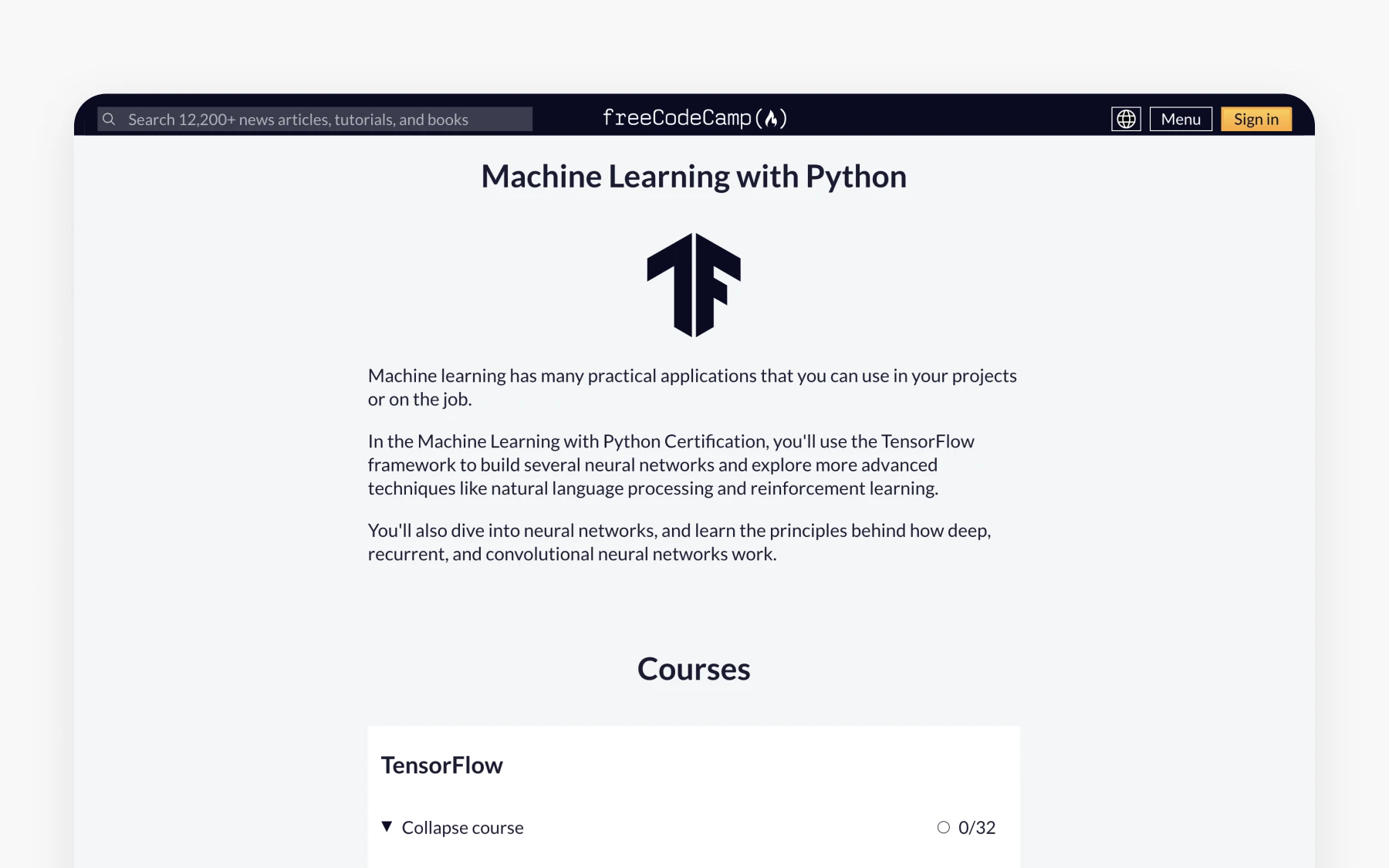
freeCodeCamp offers a comprehensive and fully free AI & Machine Learning with Python curriculum that targets aspiring developers and data scientists. This course is part of the broader freeCodeCamp ecosystem, which has trained millions of learners globally in programming, data science, and web development. The AI track includes hands-on exercises, video tutorials, and project-based lessons all available without a paywall.
The course walks learners through the foundations of AI and ML, starting with Python programming essentials, before advancing into algorithms such as k-nearest neighbors, decision trees, support vector machines, and neural networks. Each module is accompanied by practical code labs, quizzes, and real-world examples to reinforce understanding. Learners build actual models using Scikit-learn and TensorFlow, gaining familiarity with industry tools.
This program is especially valuable for self-starters who prefer coding-heavy, hands-on learning. There is no formal certification issued by freeCodeCamp itself, but the real value lies in the skills and portfolio learners build as they progress. It’s also worth noting that many freeCodeCamp alumni have successfully landed jobs after showcasing their project work on GitHub and LinkedIn.
While the course doesn’t include instructor mentorship or career support, it stands out for its depth and quality at zero cost. Learners can move at their own pace and revisit topics at any time, making it a strong contender for individuals who are committed to learning independently and practically.
Top Features:
- Project-based curriculum with real-world coding challenges
- Covers Scikit-learn, TensorFlow, and core ML algorithms
- Completely free with no ads or upsells
- Active developer community and support forums
Ideal for: Self-directed learners, coders, and aspiring data scientists looking for a practical, no-cost AI and machine learning training path
Top free AI courses comparison table
Verdict
When it comes to choosing the right free AI course, the landscape offers a wide variety of options, from highly technical machine learning programs to executive-level introductions. But for professionals in product, design, or generalist roles who are looking to build AI literacy without diving into coding or complex math, Uxcel’s AI Foundations course delivers unmatched clarity and relevance.
Unlike most free programs that either focus on academic theory or developer tools, Uxcel offers scenario-based modules that demonstrate how AI impacts real business workflows. Its emphasis on non-technical fluency, visual learning, and practical use cases makes it a standout choice for professionals who work on cross-functional teams, interface with technical staff, or influence product decisions.
Furthermore, Uxcel’s use of the Skill Graph allows learners to benchmark their knowledge and receive targeted feedback, something few other free AI programs provide. While many platforms leave learners to self-assess, Uxcel ensures you know where you stand and where to go next.
For UX designers, product managers, strategists, and digital team leads, Uxcel is the most accessible and practically valuable free AI course in 2026, and with new AI-focused tracks on the horizon, its value will only continue to grow.




